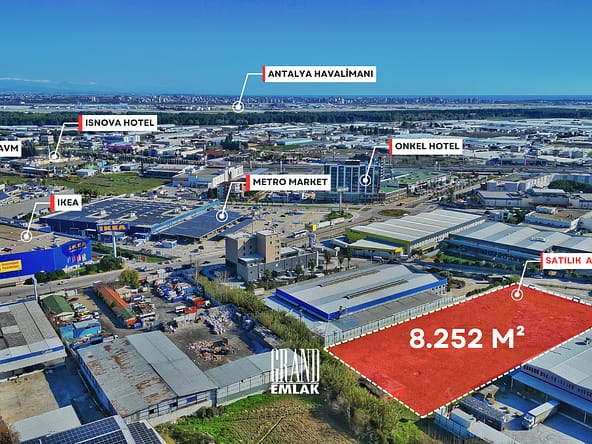Expats’ Guide for Real Estate Investment In Turkey
Turkey’s property market is vibrant and appealing, drawing many expats to invest in its variety of properties, such as seaside villas, urban apartments, and rural houses. But for expats, diving into this market can be daunting, with local rules, language barriers, and cultural differences adding layers of complexity. Yet, with the right know-how and a clear investment plan, you can confidently navigate these challenges and find your perfect Turkish property, making the process much smoother.
Essential Steps in the Process
To buy a property in Turkey, you need to follow key steps, from research to sealing the deal:
Start with Research: Expats should get to know the Turkish property scene before diving in. Check out different regions, property types, and prices online. Attend local property events and read market reports to grasp the market’s ins and outs.
Set Your Property Goals: Figure out what you want from your investment. Consider your budget, preferred location, property type, and rental potential. Having clear objectives will make your property search more efficient and save you time in the long run.
Choose a Reliable and Professional Agent: Look for a trustworthy agency and real estate agent affiliated with respected organizations like the Chamber of Commerce or the Turkish Real Estate Association. A seasoned agent will help you find properties, provide valuable local knowledge, and navigate the buying process smoothly from start to finish.
Get a Tax ID Number: Before buying property in Turkey, expats need to get a tax identification number from the local tax office.
Essential Factors to Ensure Profitable Real Estate Investments
Buying property abroad can be tricky, but focusing on key factors and understanding the process can help reduce risks and increase your chances of success.
Legal Requirements and Ownership Restrictions: Learn about Turkish property laws, especially restrictions on foreign ownership. Expats need to follow laws that limit buying land in certain military or strategic zones. Plus, ensure your property ownership is legally recorded at the land deeds office.
Plan Your Finances: It’s essential to budget properly for buying property. Think about extra expenses like legal fees, taxes, and maintenance costs. Look into mortgage choices, exchange rates, and tax impacts both in Turkey and back home.
Property Valuation and Inspection: Have a pro assess the property’s condition and value. This helps match your expectations and avoid surprises. A thorough inspection catches repair needs and red flags, minimizing unexpected risks.
Get a Trusted Lawyer: Hire a Turkish lawyer who knows property law well. They’ll safeguard your interests during the purchase, handling all legal matters correctly. Plus, they’ll offer valuable advice on Turkish property law intricacies.
Best Practices for a Profitable Real Estate Investment in Turkey
For a successful property investment in Turkey, stick to these tips to build a strong foundation for a satisfying ownership journey.
Invest in Property Insurance: Secure your investment. Get thorough property insurance to cover risks like natural disasters, theft, and liability claims, safeguarding your investment.
Connect Locally: Build a network of local contacts like agents, lawyers, and expats who’ve bought property in Turkey. They’ll help you navigate challenges and share valuable insights and expertise.
Maintain Effective Communication: Keep in touch with your estate agent, lawyer, and the seller. Clear communication ensures everyone knows what you need, preventing misunderstandings and delays.
Stay Patient: Buying property in Turkey might take longer than you think. Stay patient and diligent. Invest time and carefully review every aspect of the property before sealing the deal.
Are you an expat eager to establish your perfect haven in Turkey? Your search ends here! With our expertise and dedication, we specialize in assisting expats like you in finding the ideal property that suits your needs and desires. Whether you seek a cozy apartment or a charming villa, we’re committed to guiding you through every step of the journey. Unlock the doors to your dream property in Turkey with Grand Real Estate.
Anyone can buy real estate in Turkey from any country except Syria, North Korea, Southern Cyprus, Armenia and Cuba.
No, acquiring real estate in Turkey is now considerably quicker and more streamlined compared to numerous other countries.
No, every real estate property you acquire in Turkey is associated with a title deed, and in the event of the owner’s passing, the property is legally inherited by their family.
In Turkey, a country governed by the rule of law and known for its investor-friendly environment, numerous reputable real estate consultancy firms exist, playing a vital role in the success of the real estate sector. In essence, your rights are safeguarded by legal regulations. However, it is crucial to select the right company to ensure a positive experience and protect your interests.
You have the option to explore properties of interest through virtual tours or detailed advertisements, and subsequently, you can finalize all necessary legal procedures in Turkey by granting a power of attorney.
Given that the Power of Attorney is a document written in Turkish, which enables someone else to act on your behalf, it is crucial to ensure the accuracy of the information by having the papers translated by an authorized translator.
Absolutely! It is permissible for you to grant a power of attorney at the Turkish embassies located in your country.
Not at all! Banking procedures in Turkey are straightforward. Once you have gathered the required documents, you can open a bank account within a mere hour.
Yes, foreign nationals can also get real estate loans in Turkey. As Grand Emlak, we are ready to support you in this process as well.
The decision largely hinges on the interest rates prevailing in the buyer’s country of residence. If lower interest rates are available, it might be more favorable to opt for a mortgage in your own country.
Yes. Foreigners can use housing loans in Turkey without having to open an account beforehand.
The process typically remains consistent. Each party must individually register within the system, and the sales amount they enter into the system should reflect their respective percentage of ownership.
No, checks are not accepted as a valid form of payment for real estate transactions in Turkey. Only cash and bank transfers are accepted methods of payment.
Absolutely! The procedure for acquiring a tax number is typically similar for both Turkish citizens and foreigners. Online options are available for obtaining a tax number.
If your tax ID number is lost, you can easily request a reprint in Turkey. However, it is advisable to keep a copy of your tax ID number in a secure location to avoid any complications.
Tax identification numbers in Turkey do not have an expiration date. Once obtained, you can use the same tax number for the entirety of your life.
The evaluation process is actually essential as it safeguards the buyer from excessively high property prices. When purchasing a property, the title deed requires a valuation report approved by the Capital Markets Board (CMB) as evidence of a fair transaction. This evaluation process typically takes around 3 to 6 days.
The land registry offices typically require evaluation reports that have been prepared within the last three months.
Generally, for new projects, a 10% deposit is required, followed by a 30% down payment to be made within four weeks. Installment payment options are often available, allowing for lump sum payments after each stage of construction. The flexibility of installment plans may vary depending on the specific circumstances.
In the case of a new project, the project management team determines the price of the properties. These prices are set independently and are not inclusive of agency commissions.
For detailed information regarding the required documents for deed transfer, you can refer to our dedicated blog post on the subject. It contains all the relevant information you may be seeking:
Once all the necessary documents have been gathered and an application has been submitted to the General Directorate of Land Registry, the deed transfer usually concludes within a single day.
Title Deed Guarantee, also known as Deed Swap, is an alternative method of transferring property ownership in Turkey. In this process, the buyer makes the payment to the seller through Takasbank, which serves as Turkey’s central clearing and transaction institution. After verifying the successful transfer of the title deed to the buyer, the funds are then transferred to the seller.
On the day of the title deed transfer, you will be handed the keys to the property you have acquired.
DASK insurance, provided by TCIP (Natural Catastrophe Insurance Pool), is a mandatory earthquake insurance for properties in Turkey. Without TCIP coverage, you will be unable to register your property for essential public services such as water, electricity, and natural gas.
Property insurance in Turkey is tailored to the specific characteristics of your property. Insurance companies can provide you with quotes once you furnish them with the necessary information about the property you intend to purchase. If the offered price is agreeable to you, the insurance process can be finalized.
You have multiple options for paying your electricity bills in Turkey. You can set up an automatic payment order linked to your bank account or make payments online, in person at bank branches, or at designated payment points.
If you have owned the property for a period of five years or longer, you are exempt from property income tax. However, it is crucial to ensure that all outstanding bills are paid up to date before initiating the resale process.
Turkey offers numerous lucrative opportunities for real estate investments with high returns. Additionally, you don’t have to navigate this process alone as Grand Emlak provides comprehensive after-sales services.
Our company’s legal team is responsible for drafting the sales contracts to ensure a legally sound transaction.
The sales contract contains clearly written terms and conditions agreed upon by both the buyer and the seller. In the event of any conflicts or disputes, legal measures and sanctions are in place to ensure appropriate resolution.
Real estate agent fees in Turkey are regulated by law. When selling a property, registered and licensed real estate agents are entitled to receive a service fee of 2% from both the buyer and the seller, separately, based on the actual selling price of the property.
Yes, buying property in Turkey is considered safe, particularly when you engage with a reputable and professional real estate company. Working with experienced professionals ensures a smooth and secure transaction process.
Absolutely. Purchasing real estate in Turkey is known to be a highly lucrative investment. For more in-depth information and insights, we recommend referring to our dedicated blog post on the subject.
No, a residence permit is not mandatory for buying property in Turkey. However, having a residence permit offers numerous advantages. If you wish to obtain a residence permit, the team at Grand Emlak is prepared to assist you with the necessary procedures and transactions.










